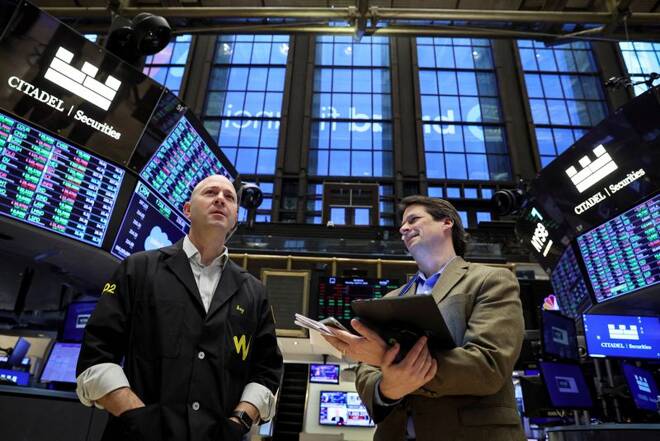Advertisement
Advertisement
U.S. banks set for better-than-expected trading revenues
By:
By Matt Scuffham NEW YORK (Reuters) - Trading may be a surprise bright spot for Wall Street banks in the first quarter, after clients rejigged portfolios in response to Russia's invasion of Ukraine and interest rate hikes, analysts and executives say.
By Matt Scuffham
NEW YORK (Reuters) – Trading may be a surprise bright spot for Wall Street banks in the first quarter, after clients rejigged portfolios in response to Russia’s invasion of Ukraine and interest rate hikes, analysts and executives say.
But quarterly results from banks including Goldman Sachs and JPMorgan Chase & Co will show a sharp decline in investment banking revenues and in first-quarter earnings overall. That is due to companies pausing deals until choppy equity markets stabilize.
Coming into the year, banks had expected trading volumes to decline to levels similar to 2019, following exceptional activity in 2020 and 2021. Traders had benefited from the Federal Reserve pumping liquidity into markets to mitigate the economic impact of the COVID-19 pandemic.
But the conflict in Ukraine, which Russia calls a “special military operation,” and the prospect of multiple interest rate hikes as the Fed attempts to bring inflation under control, has led to traders enjoying another bumper period.
“There’s definitely been more volatility than we expected coming into the year and that volatility benefited trading businesses, particularly on the fixed income side,” said one senior New York-based banker.
Uncertainty over the pace of interest rate hikes by central banks has stimulated rates trading, the source said.
Another senior executive at a European bank with large U.S. operations said his firm’s trading businesses had enjoyed a “pretty phenomenal quarter.”
“It was a very similar trend to what we saw in the same quarter last year in terms of volumes,” he said.
Banks face exceptionally tough comparatives. The first quarter last year saw major equity indexes hit record highs, driving volumes. Having initially forecast sharp year-on-year declines, analysts now expect a similar performance this year.
Analysts at Moody’s anticipate a boost in banks’ trading revenues “that could roughly mirror the exceptional results of first-quarter 2021,” they said in a research note.
Still, some see more headwinds. Christopher McGratty of Keefe, Bruyette & Woods estimates an 18% decline in trading revenues.
‘GOOD VOLATILITY’
Traders are hoping they continue to see “good volatility,” where clients are encouraged to buy and sell securities to reshape portfolios, rather than “bad volatility,” where liquidity dries up due to bid/ask spreads being too high.
Equity trading surged in the first quarter as the VIX – a measure of expected 30-day volatility for U.S. stocks that some call Wall Street’s fear gauge – spiked. Fixed-income trading ramped up as clients hedged their positions, bankers say.
Rapid shifts in asset prices can mean banks benefit from increased trading volumes as clients adjust their exposures. But they present dangers too, from counterparty risk.
The London Metal Exchange (LME) was forced to halt nickel trading earlier this month after prices doubled to more than $100,000 per tonne, a rise which sources blamed on short covering by one of the world’s top producers.
The New York-based bank executive said his firm had been “carefully monitoring” its commodities exposures and testing the liquidity of clients on a regular basis.
Another downside for banks has been a sharp drop in investment banking fees as companies hold off on deals. M&A advisory fees are expected to drop by 30-40%, analysts say.
Equity capital markets (ECM) issuance dropped 70-80%, according to analysts. The decline in major equity indexes led to initial public offerings virtually drying up.
Despite that, pipelines remain healthy and activity could pick up quickly when markets stabilize, bankers say. Companies could be encouraged to make acquisitions because valuations have declined from last year’s highs. That could, in turn, lead to a pick-up in equity capital markets.
“The first quarter marked a significant shift in the operating environment, but we continue to see opportunity in the year ahead,” said JMP Securities analyst Devin Ryan.
(Reporting by Matt Scuffham; Editing by Megan Davies and Nick Zieminski)
About the Author
Reuterscontributor
Reuters, the news and media division of Thomson Reuters, is the world’s largest international multimedia news provider reaching more than one billion people every day. Reuters provides trusted business, financial, national, and international news to professionals via Thomson Reuters desktops, the world's media organizations, and directly to consumers at Reuters.com and via Reuters TV. Learn more about Thomson Reuters products:
Advertisement
